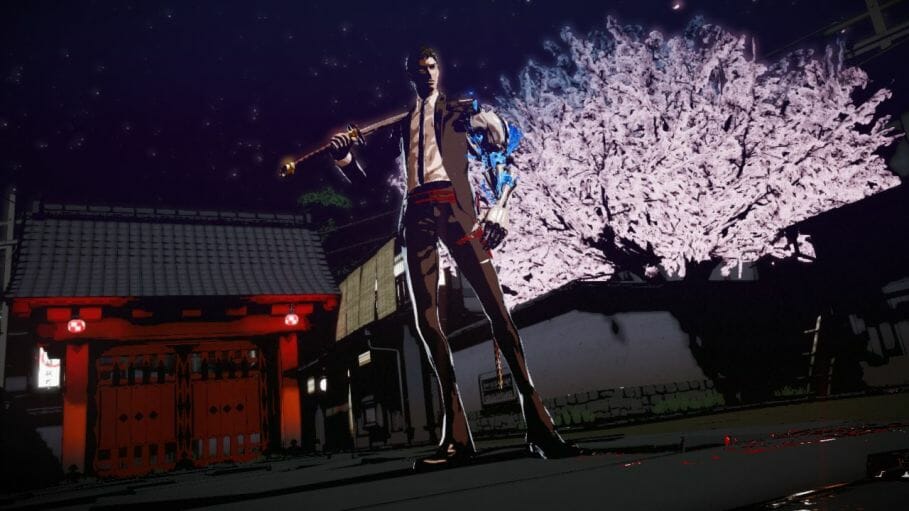Killer Is Dead (Multi-Platform)

Killer Is Dead gains total self-awareness by its fourth mission. The protagonist, a katana-slinging, suit-wearing, demon-fighting assassin named Mondo, receives an offer from an enemy. “Why don’t we join forces?” suggests David, an ostentatious super-villain who rocks a golden codpiece and intends world domination. Mondo refuses, on account of the “tons of complaints from gamers” he’ll get if he agrees.
“Isn’t this supposed to be an action game?” Mondo quips, all but winking at the camera. Then, just in case the anvil hadn’t broken every vertebrae quite yet, Mondo reiterates: “It’s all for the sake of the game.”
Get it? These two men are characters in a videogame. What’s more, everyone in this game knows they’re in a videogame. They also seem to know they’re not in a very good videogame, because everyone seems very depressed. Cut-scenes and conversations take four times longer than necessary, what with all of the pauses, repetitions, tired one-liners, unexpected screams and dramatic stares. Mondo in particular spends most of the game looking as uncomfortable as I feel when I try to maneuver him around his broken world.
The world Mondo lives in is falling apart. Oh, not the fictional world—the literal videogame world. The Xbox 360 version of Killer Is Dead clips, skips and stutters; the camera struggles to keep up with Mondo’s katana slashes; long loading screens softened by smooth jazz interrupt key narrative moments. The game’s graphics look striking so long as Mondo stands still; as soon as he moves, it’s all downhill.
Mondo’s combat style reminds me in part of Lollipop Chainsaw, another recent title by Goichi Suda (a.k.a. Suda51), but it’s even more similar to the original Kingdom Hearts games—except Kingdom Hearts made more mechanical and thematic sense (which is saying something). Killer Is Dead revolves almost entirely around dodging and pressing the “X” button; as the game goes on, you unlock more simple combos and secondary fire, but not much. The simple pattern of dodging and attacking over and over lacks the flash of Kingdom Hearts and the smoothness of Batman: Arkham Asylum; in other words, this has been done before elsewhere, but much better.
Suda51 games tend to emphasize style over substance. Unfortunately, this game lacks both style and substance. The stuttering graphics and repetitive combat happen to be surrounded by an unfunny, badly written narrative. Suda-fronted games have gotten progressively less clever over time, and Killer Is Dead is another notch on that steadily declining graph. How often can videogame jokes about videogames still feel fresh? It’s hard to say which element of the game is the most disappointing, but the terrible pacing, incomprehensible plot, and stilted, unfunny dialogue may well take the cake.
Confession: this game still managed to make me laugh out loud, in parts. Killer Is Dead fails so thoroughly that, at times, it crosses over from “bad” into “so bad it’s good”, especially with a friend or two in tow. It’s easier to enjoy jokes this bad if a friend is there to laugh along and trade the controller back and forth so that the combat feels less boring. Playing Killer Is Dead by myself made me feel depressed, but with a friend, it felt bearable.
I’m not sure Suda realizes that he’s lost his edge, or that jokes about being in a videogame just aren’t that funny anymore. I’m also not sure he realizes that the anime tropes he’s mimicking (or … parodying? Who knows?) went out of fashion even in actual anime back in the ‘90s, maybe earlier.
Killer Is Dead might work as a partial parody of the Devil May Cry series, in which an over-the-top bad-ass fights monsters alongside improbably busty colleagues, but that’s a comparison that Killer Is Dead just can’t afford. I spent most of the game wishing I was playing Devil May Cry instead, rather than laughing at this potential lampoon. Plus, Devil May Cry is already trying to be over-the-top and comedic; what more can a parody of it hope to do?
I’m also not sure whether Suda wants Killer Is Dead to be a parody of any other existing demon-fighting game, or whether he wants it to stand on its own. I think the real answer is that he just doesn’t care. The game’s themes reminded me of fan-fiction I wrote in seventh grade: cobbled-together tropes inspired by Cowboy Bebop and Pokemon, plus terrible, unrealistic “sexy” scenes that only someone with no sexual experience could invent.
